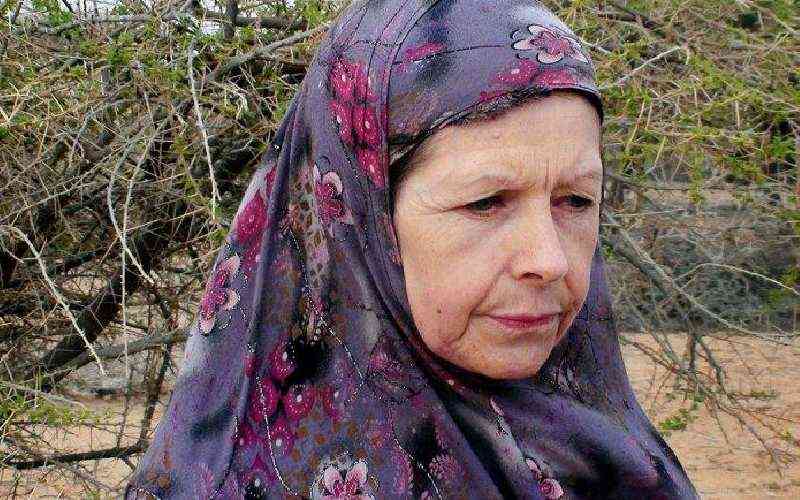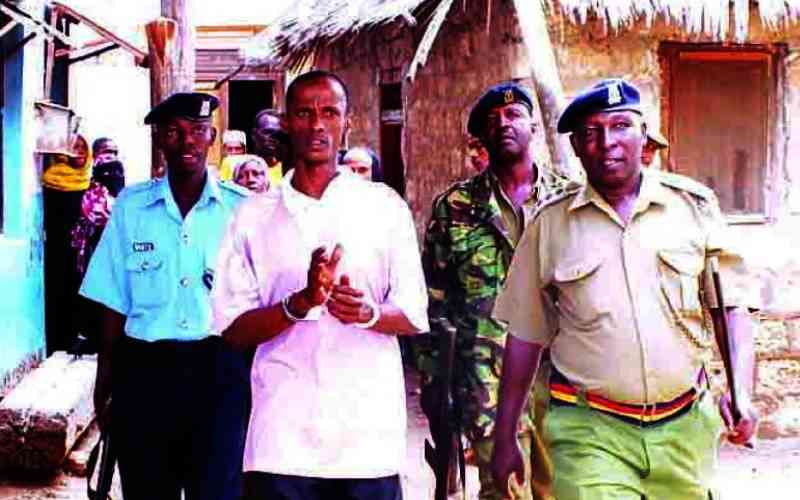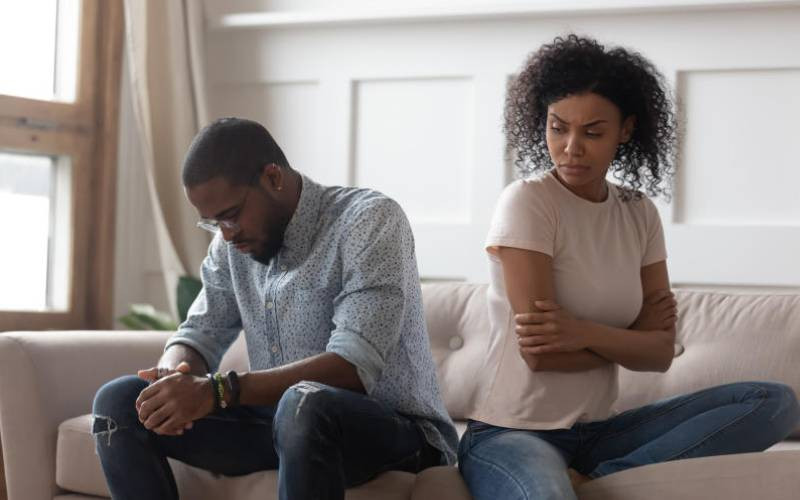
Judith Tebbutt. She was kidnapped from a resort in Kiwayu Island, Lamu County. [File, Standard]
The murder of David Tebbutt and the kidnapping of his wife Judith in 2011 from a tourist resort in Kiwayu Island, Lamu County, played a huge part in defining Kenya's foreign policy towards neighbouring Somalia.
These events, from September of 2011, put in motion a chain of developments that led to Kenya's invasion of its north easterly neighbour.
For more than a decade now, Kenya's armed forces, re-hatted into the African Mission in Somalia brigade (Amisom), continue to patrol border regions with the aim of keeping Somali terrorist group, Al Shabaab, away from its borders.
The Tebbutt saga though, was not short of twists and turns.
Locally, the investigations were considered shut after the arrest, trial and jailing of Ali Batitu Kololo for David's murder and collision with the pirates that led to Judith's kidnapping.
As he served his time, it quickly emerged from investigations that Kololo's conviction was hinged on a fictitious account of events from a British police officer who lied to the courts and ignored crucial forensic evidence that could have helped the investigators pursue the real individuals behind the attack on the Tebbutts.
In an interview with The Standard, in conjunction with rights lobby group Reprieve, Judith Tebbutt speaks of Kololo's arrest, the toll that an innocent man's conviction has taken on her and the relief that Kololo is staring at freedom after years of torture, imprisonment and incredible loss. The possibility of Kololo's freedom, she says, provides a slight silver lining on the dark cloud from the events of September 11, 2011.
Tell us about Kololo.
Judith Tebbutt: Ali Kololo, as far as I'm aware, he was a wood cutter, a honey gatherer. So he was picked up 11 years ago now by the Kenyan police, I believe, and accused of playing a part in my husband's murder and my abduction, which I, to this day don't believe that he did. He has been in prison. I believe he's in prison in Kenya as we speak. And he's awaiting a fair trial, which is something that he should have had right at the beginning, which he was robbed of, in my opinion.
Did you ever have a chance to find out more about him and his family?
Judith Tebbutt: I know that he was married with two children. He has, I think, a brother and a sister. But what I understand now, sadly, is his father passed away. One of his brothers also passed away. His wife left him. Obviously, I don't know the circumstances around that, but it's obviously something to do with the fact that he was put in prison, I imagine. And at the moment, I understand that his two children have had to come out of school to support the family, their grandmother, who is the surviving relative that looks after them, which I know, in my mind, I think that's completely wrong. It's all wrong. Ali should not be in prison because he's lost ten, 11 years of his life. But now his children are also losing the opportunity for an education. And I think that's shocking. Absolutely shocking. Shouldn't have happened, but it's out of necessity, I believe.
You've touched on this already, but do you think Kololo received a fair trial?
Judith Tebbutt: Not at all. I never have. I mean, I gave my first TV interview in 2017 and I was stating exactly what I'll state now. I don't believe he received a fair trial. To me, a fair trial is him having power over what he can say and what he understands is going on. And that didn't happen. As I understand it, he was given the prosecution statement an hour before he was due in court. I later found out that he wasn't offered an interpreter. He wasn't offered a lawyer. He went into that trial really not knowing what he was doing, and I could see it in his face. He looked like a rabbit in headlights. He looked shocked. And I was able to say, as I did then and I do now, that he was not part of that group that held me. I'd never seen him before. How? You know everyone, everyone deserves a fair trial. And he didn't receive it. And he was robbed of that. And he's been paying the consequences for the last 11 years.

Now that we've learned more about the investigation, what's your view of it?
Judith Tebbutt: I'm quite cross about it because it's... I didn't think things like that could happen. You know, I always thought the police were, you know, they just did their duty. I mean, there were bits of evidence that were not produced in court. There was evidence that could have been misleading. And this was a senior investigating officer, a British officer, doing this. I just think it's deplorable... I am worried an innocent man has been robbed of a fair trial and because of things that weren't said. Things that were withheld. And I hope that doesn't happen again. I hope with this appeal, Ali will get a fair hearing and it will have a positive result for him. I hope the judge considers all the facts in a fair and honest way.
How do you feel knowing that Ali's appeal hearing is finally going to be heard?
Judith Tebbutt: To know that, Kololo's trial is in a couple of weeks time, is amazing. It's taken a long time to get to this point. So I'm hopeful... I have to be honest. I'm hopeful that it will have a positive result for Kololo. It's been a long time. And you know the fact as well that I find it amazing that people from Reprieve and Mr Olaba (Kololo's lawyer), especially Mr Olaba, are doing this all pro-bono. That's admirable. That is really, really admirable. I think that's fantastic.
Why is it so important to you that KoloIo should be given a fair trial?
Judith Tebbutt: I believe he is an innocent man and he should be freed... I know for sure that he wasn't part of that group that took me that night. There were five men that took me that night. He was not one of them. I think that he was robbed of a fair trial. I think there was a huge imbalance of power, which doesn't really sit well with me. I think he was, you could go so far as to say he was a bit of a scapegoat because when he was put in prison all investigations into the actual murderer of my husband and the pirates that took me ceased. So the people that took me are still out there, free, whereas Kololo, who I believe didn't have anything to do with the death or my abduction, has been in prison for the last 11 years.
Does it pain you that Kololo has not been released yet?
Judith Tebbutt: Does it pain me that Ali has not been released yet? Yes, of course. It's very odd, because Kololo has been part of my life for the last 11 years. And quite honestly, there hasn't been a week when it goes by when I don't think: I hope he lasts another week. I hope he lasts another week. And he has done. And I'm so relieved that we've got to this point that people are taking this seriously.
Do you believe the men that did this to you will ever be brought to justice?
Judith Tebbutt: No, that was a very quick answer, wasn't it? I don't believe that they will ever be brought to justice. And that pains me as well, considering that I have identified five different members of that group. And indeed, the negotiator and the two men who I believe were responsible for David's murder were the last two men in that boat. And I could identify them tomorrow. They're in my head. They won't go out of my head. But I also think that if there is well, I know that if Kololo is given a fair trial and he is freed, that will go a long, long way to help me move on, because I've had to adjust to the fact that David's murderers will never be brought to trial. Those men that kept me in solitary confinement for over six months, they will never be brought to trial.
 The Standard Group Plc is a multi-media organization with investments in media platforms spanning newspaper print
operations, television, radio broadcasting, digital and online services. The Standard Group is recognized as a
leading multi-media house in Kenya with a key influence in matters of national and international interest.
The Standard Group Plc is a multi-media organization with investments in media platforms spanning newspaper print
operations, television, radio broadcasting, digital and online services. The Standard Group is recognized as a
leading multi-media house in Kenya with a key influence in matters of national and international interest.

